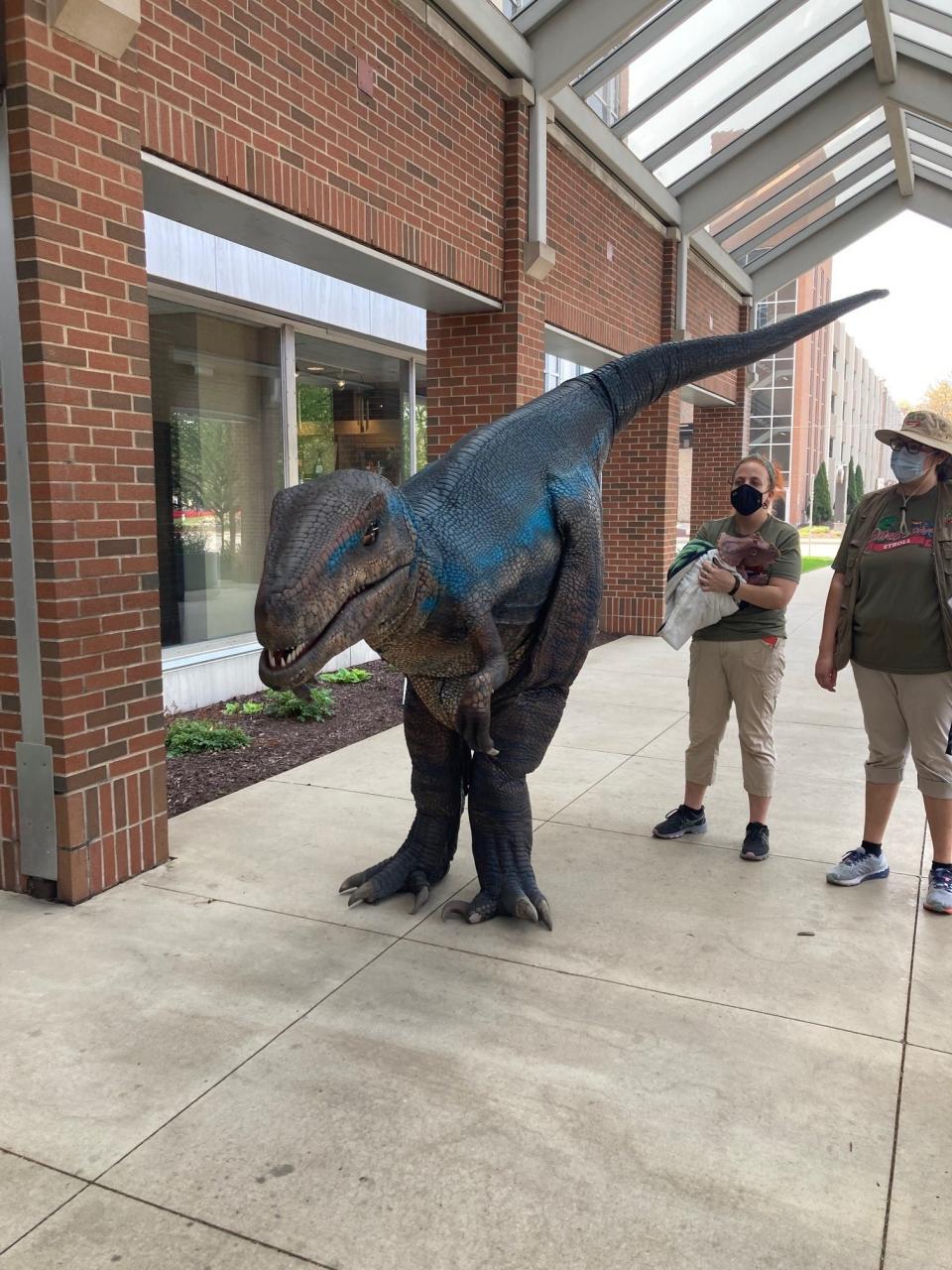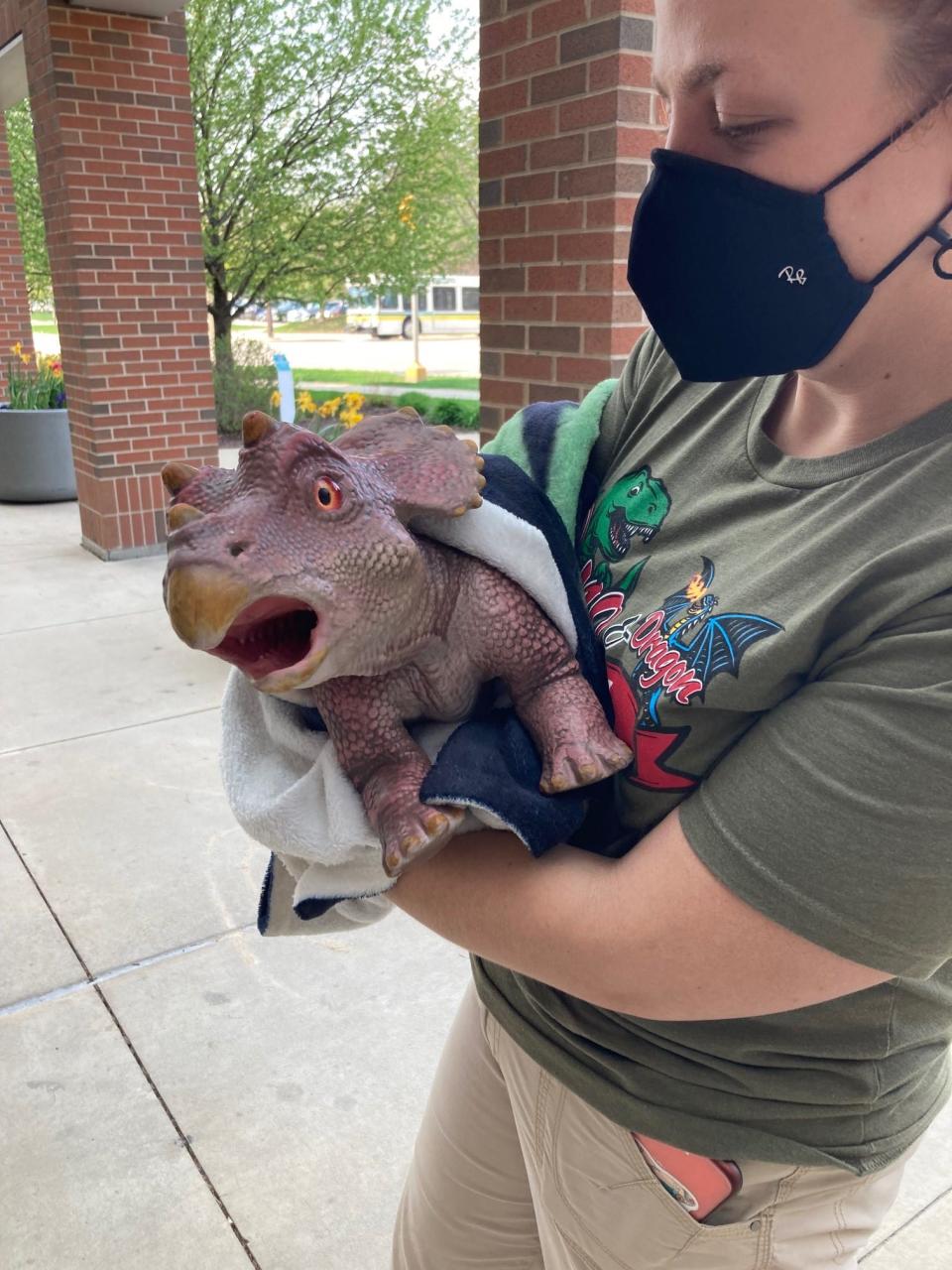How do you ease a child's mind about a medical condition? At one local hospital, the answer is walking dinosaurs.
GREEN BAY - Dinosaurs aren't commonly associated with soothing energy, but when a dancing velociraptor and a grooving baby triceratops moseyed down to HSHS St. Vincent Children's Hospital on Thursday, children, parents and hospital staff alike beamed with joy.
While the hulking velociraptor was a touch too frightening for toddler Autumn, she could pet the gentle triceratops and giggle at its bobbing head.
"The biggest thing we want when doing events like this is make the hospital experience more like normal life," Ashley Thompson, child life supervisor at HSHS St. Vincent Children's Hospital, said. "Our goal is to always make them feel like a normal child."
Animatronic dinosaurs may not be in the realm of everyday life, but moments like this can help take a child's mind off the treatment they're under, the CT scan they're scheduled for and the IV catheter in their hands, depending on their circumstances.

It's one of many types of intervention taking place at St. Vincent Children's Hospital, the only hospital in the region with a dedicated child life team. Beyond dinos, child life specialists work directly with the children to explain in terms they understand why they're in the hospital. Knowledge, rather than withholding information, can put a child's mind at ease and meet them at their level. And then, of course, there's lots of playtime.
REALTED: Dinosaurs visit children at HSHS St. Vincent Children's Hospital in Green Bay
Studies suggest that as many as one in four children in the U.S., or 15 to 18 million children under 18, have a chronic health problem and, according to the Centers of Disease Control and Prevention, 2.1% of children aged 5 to 11 are in fair or poor health. Children who undergo hospital treatment and diagnoses can often feel scared or anxious, which can prevent doctors from performing necessary medical procedures such as drawing blood or inserting a chemotherapy port.
When children are invited to participate in the medical procedure, it can put their minds at ease. To better explain why IV placement is crucial for a CT scan, for example, child life specialists bring in a medical doll and use real medical tools on it.
Breaking news fast: Download our app
Thompson said giving children a sense of control in their lives, whether that's being able to laugh with them in astonishment over a dancing velociraptor or having them actively participate in their medical procedure by way of performing first on a medical doll, enhances their mental health.
"The root of what we do as child life specialists is connecting with those patients, and it's through play," Thompson said. "Teaching them about why they're in the hospital … can help their mental health a lot. They can say, 'Now I know why I have to have a tube placed in my hand.'"
And it isn't only working with sick children that uplifting their spirits becomes important. Thompson said she and her team also work with children across other HSHS systems such as St. Clare Memorial Hospital in Oconto Falls for children undergoing pediatric dental surgeries and St. Mary’s Hospital Medical Center in Green Bay for children undergoing surgical procedures.
Sometimes, children aren't sick or going through any medical distress at all, but are the children of adult patients. Circumstances can escalate quickly, as in cases where sudden death occurs or a parent is going through a particularly painful session of chemotherapy.
"If there's a mom newly diagnosed with breast cancer, I would actually bring the child into my child life room, which is located on the second floor and show them the (medical) doll that has a port just like Mom," Thompson said. "Breaking down those illnesses helps them better cope in the future."

Thursday's dinosaur visit to the children's hospital hit certain patients differently. Most of the children, Thompson said, were understandably scared of the velociraptor, but for one teenager who has had a particularly hard time with her health, the big goofy creature was just what the doctor ordered.
"She had the dinosaur in the room with her for five minutes. She didn't have to think about why she was in the hospital room," Thompson said. "Being in a hospital doesn't have to mean always thinking about your diagnosis."
With all the care and comfort child life specialists provide at St. Vincent Children's Hospital, these moments where they can laugh open-mouthed with kids is also good for their own mental well-being.
"It cuts into the monotony for sure," Thompson said. "And seeing Autumn having happy interactions with the little triceratops, that was really, really cute."
MORE: Bird expands scooter, e-bike rentals in Green Bay after hugely successful pilot last summer
MORE: Wisconsin abortions declined 60% in three decades, new report shows
Natalie Eilbert is a government watchdog reporter for the Green Bay Press-Gazette. You can reach her at neilbert@gannett.com or view her Twitter profile at @natalie_eilbert.
This article originally appeared on Green Bay Press-Gazette: St. Vincent Children's Hospital uses visiting dinosaurs to ease fear

